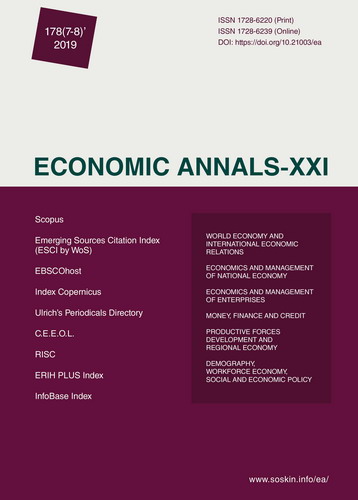Transformation of the nature of terrorism in the conditions of glocal social space: political, legal, economic and communication aspects
Transformation of the nature of terrorism in the conditions of glocal social space: political, legal, economic and communication aspects
Author(s): Svitlana Tishchenkova, Nataliia Cherniak, Yuliia Chaplynska, Olena SoldatenkoSubject(s): Communication studies, Security and defense, Globalization
Published by: Institute of Society Transformation
Keywords: Ambient Terrorism; Viral Terrorism; Incomplete Historic Gestalt; Terrorist Hotbed; Victimization; Economic and Political-legal Instruments of Countering Terrorism;
Summary/Abstract: The paper presents findings of a complex research on the problem of countering terrorism in the conditions of global socioeconomic and legal space. In particular, an analysis is conducted to determine the nature and sources of the origin of terrorism with further substantiation of its two types - ambient terrorism and viral terrorism. To reveal the essence of ambient terrorism, we introduce the notion «incomplete historic gestalt», the underlying meaning of which comprises conditions and factors favourable to the development of terrorist hotbeds. The work establishes cause-effect relations between upsurge of the terrorist threat in certain countries of Africa, Europe and Asia and the state of social and economic development of these countries. The paper further elucidates modern trends in determining the location of terrorist hotbeds according to its nature. In particular, we considered the factor of the information society in different regions to assess the level of danger of viral terrorism. For this purpose, we employed the data supplied by the ICT Development Index and the Worldwide Press Freedom Index together with the Global Terrorism Index. We have found out that a high level of freedom of speech and pluralism become a tool for forming the rhetorics of radicalism and extremism among the population. Such a trend is representative for the countries that became the recipients of large migration inflows from Asia and Africa lately: the United Kingdom, Germany, France, and Belgium. It has been concluded that ambient terrorism has a more or less sustained pattern and is localized in the territory of states immersed in crisis conditions, while viral terrorism does not have a permanent location, being unpredictable, mobile and rapidly spreading. At the same time, we must admit that conclusive identification of the nature of contemporary terrorism is extremely complex. It transforms dynamically and has a hybrid nature.
Journal: Економічний часопис - ХХІ
- Issue Year: 178/2019
- Issue No: 7-8
- Page Range: 4-16
- Page Count: 13
- Language: English

